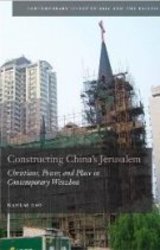Reading Cao Nanlai’s classic Constructing China’s Jerusalem[1] in light of the highly publicized attacks on Wenzhou churches, the obvious question is whether the “Wenzhou model,” as Cao describes it, is still intact, or whether government intervention has significantly altered the formula of church growth and cultural transformation.
Cao’s study describes a convenient marriage between the goals of state and church:
Though the revival of Christian religion and the emergence of private enterprises appear to be signs of autonomous space for civil society being reclaimed from the totalizing state, Christian entrepreneurs and the post-Mao state actually share many important concepts, aspirations, and interests–particularly in the common pursuit of stability and development.[2]
The government’s economic reform program and desire to build “socialist spiritual civilization” dovetail nicely with the church’s quest not only for numerical church growth but also improvement in the “quality” of Wenzhou’s Christians. This latter aspiration may be seen in the church’s emphasis on education, its ostentatious church buildings, and its emulation of Western Christian culture.
The “boss Christians” running the church fill a dual role as successful entrepreneurs during the week and shepherds of the flock on Sundays. Women in the church, whose role is primarily to serve rather than to lead, support both the economic and spiritual endeavors while reinforcing traditional Chinese gender roles. Urban migrant believers are likewise relegated to subordinate status not only on the factory floor but also within the church hierarchy.
For its part, the Wenzhou government, according to Cao, has been a willing party in negotiating the church’s outsized cultural footprint. The reasons are several. Christians contribute in a major way to the city’s economy. They are law-abiding citizens. They help those in need. And there are so many of them that putting the brakes on Christian activity would be a major and in some ways self-defeating undertaking, particularly since many officials are themselves Christians.
Up until now.
During the past year and a half Wenzhou has witnessed the most blatant attack on the church since the Cultural Revolution. Under the guise of enforcing building code regulations, provincial government officials have overseen a campaign to forcibly removed crosses from well over 1,000 church buildings. Pastors and lay people who have resisted have faced physical abuse, detention, and criminal charges. Some, like lawyer Zhang Kai, who attempted to find a legal solution to the dilemma facing the churches, have simply disappeared.
The current wave of attacks has two curious attributes.
Most of the churches affected have been government-registered congregations whose right to publicly exist is guaranteed not only by their cordial relations with local officials but, more importantly, by the protection ostensibly offered by the Three Self Patriotic Movement, to which these congregations belong. Secondly, although crosses have come down and, in a few cases, whole buildings destroyed, the congregations themselves have, for the most part, continued to meet unhindered.
The key to answering the question posed above is whether the government’s main concern was, in fact, the overt physical presence of so many churches, or whether the demolition campaign is but a precursor to a more intrusive and more widespread effort aimed at shutting down the churches altogether—or at least curtailing their influence—not only in Wenzhou but in other cities as well.
Image credit: Urban Life, Beijing, China by Nick Piggott via Flickr (cropped).

Brent Fulton
Brent Fulton is the founder of ChinaSource. Dr. Fulton served as the first president of ChinaSource until 2019. Prior to his service with ChinaSource, he served from 1995 to 2000 as the managing director of the Institute for Chinese Studies at Wheaton College. From 1987 to 1995 he served as founding …View Full Bio
Are you enjoying a cup of good coffee or fragrant tea while reading the latest ChinaSource post? Consider donating the cost of that “cuppa” to support our content so we can continue to serve you with the latest on Christianity in China.
